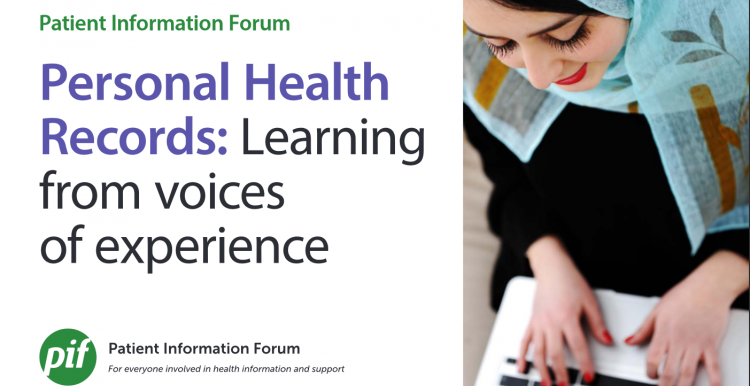Personal Health Records: Learning from voices of experience

“Using my GP records gives me such a wonderful feeling of control over my stuff. It’s so liberating being able to make appointments, order repeat prescriptions and see test results for myself!"
The Patient Information Forum
Personal Health Records (PHRs) are a digital space for people to record and engage with their health and care information, and the Patient Information Forum (PIF) have launched a new guide sharing the experiences of people who have first-hand experience of developing or using PHRs.
With issues such as digital health, self-care and supported self-management dominating current health policy, this guide shares real life examples of how PHRs could impact people’s health and wellbeing, and change health services.
Voices of Experience
The guide starts by exploring what sorts of PHRs are available and who might want them. It discuss aspects of PHRs that the people we spoke to highlighted as being the most important, concluding with a checklist of key things to consider.
In the guide Ingrid Bridle, long-term patient and Chair of her GP Patient Participation Group in Tameside, talks about how online access to GP records benefits her:
“Using my GP records gives me such a wonderful feeling of control over my stuff. It’s so liberating being able to make appointments, order repeat prescriptions and see test results for myself. You can do all that through your record!
You can access your GP record 24/7, everywhere in the world. I’ve got an app on my mobile phone that enables me to do this. Once, when I was on holiday in France and I needed to go into hospital unexpectedly, I went in with all the info from my records, which my friend helped to translate.
When explaining record access to people, we should be asking, ‘Would you like to be more independent and not have to keep bothering the surgery to ask for things? Would you like to be able to check whether your referral letter’s actually gone, so you can chase for your appointment if you’ve been waiting for a long time? Would you like to read your consultant’s letter, so you can see whether you understand it and get more information if needed?’
We should also be asking, ‘Would you like a reminder of what your doctor tells you during your consultations – about your medication, for example, so you can take it properly, or what’s going to happen next?’"
Sue Farrington, Chair of the Patient Information Forum says:
“While researching this guide, it quickly started to feel as if there are two parallel universes. One is inhabited by people who know almost nothing about PHRs and who are uninterested in them.
Another, much smaller, universe is inhabited by people who know a great deal about PHRs, people who speak passionately about the potential benefits of PHRs.
We are excited to be able to share the voices of the people who are successfully using PHRs today. We hope our guide can be a starting point for a conversation about how we can make the most of the opportunities they provide to improve our health and health services.”
You can download access the guide here:
PIF Guide to Personal Health Records: Learning from Voices of Experience